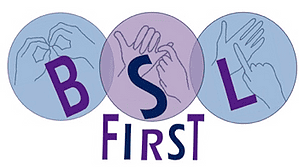Why did you want to become a deaf interpreter and translator?
I was working as a TV presenter and previously a support worker. As part of my support worker role I would regularly translate documentation to support Deaf individuals. I became interested in the translation and interpreting process and decided to formalise my studies to gain a qualification in the hope that it would bring me more work opportunities.
Before starting the course I had completed Level 3 BSL and Level 6 BSL qualification. I had completed hands-on training for Deaf-blind individuals and an awareness course on people with Ushers. I had also completed an ILM level 3 in Business Management.
Why did you choose the DIDP pathway over other pathways to become a deaf interpreter?
I chose the DIDP pathway as it is London based. It is also the only pathway that has a Deaf group and supports those who English is their second language. I knew they were also working with a variety of academics and skilled people who would support me with the process.
What do you feel were the benefits of the DIDP course?
I found the online Moodle site a real useful resource. Everything would be uploaded, articles, reading lists, exemplars and other information you would need to support you in completing your assessment. I also felt the course made use of the groups own experience in sharing their knowledge. The course was a brilliant pathway to become a brilliant standard Deaf Interpreter and Relay.
What was learning in a fully deaf group like?
It was a fantastic experience to learn in a fully Deaf environment. It was wonderful to share and learn from other Deaf participants experiences. We were all from different parts of the UK, so brought regional variations. It was brilliant to learn in my first language, BSL, and know there would not be in barriers within the learning environment. We could connect, empathise and learn in a different way than if I was within a hearing group, we all had lived experience of being Deaf in common that united us a learning group.
What’s next for you in your interpreting and translation career?
I am continuing to work as a TV Presenter for BSL Zone ‘This is Deaf’. I have started working as a Deaf translator for a variety of media companies such as: Red Bee Media, Remark!, Able media, Drip Media, RAD and a variety of theatre companies and councils. I am also part of the BSL Advisory Board group working with the Government on the BSL Act and I have recently become a trustee of BDA as of 2023. I also volunteer and committee for DIN with ASLI. I have also started accepting working as a Deaf relay, this is something I hope to continue to gain more experience in.
What advice would you give to other deaf people thinking about becoming a deaf interpreter and translator?
I would say it is not an easy process, there are lots of challenges along the way, especially in understanding the academic theories. But if you have a passion for the language and learning about BSL/English translation then I think this is the course for you. You will be exposed to a new perspective of BSL through studying linguistics and translation theory. It will be a challenge, but it will be worth it!
